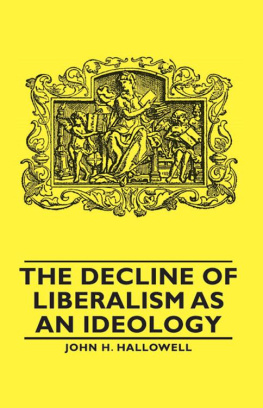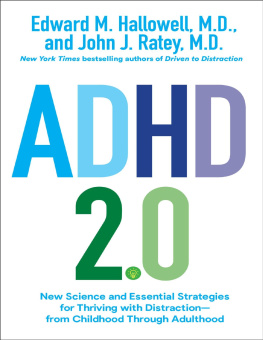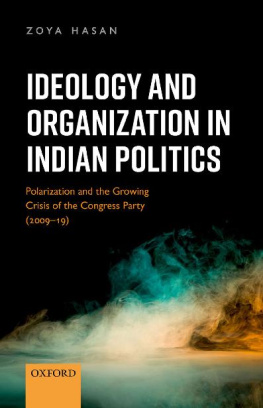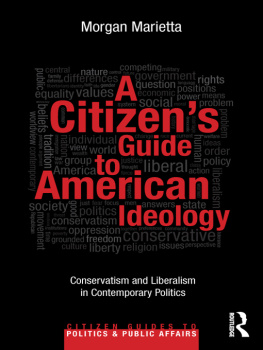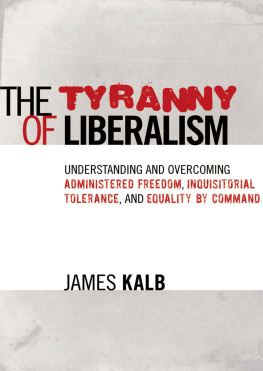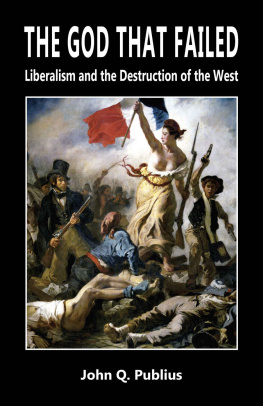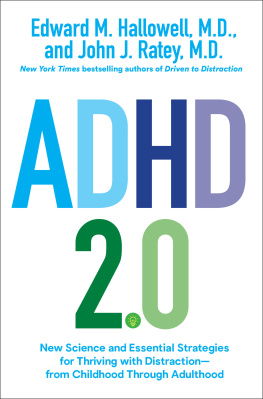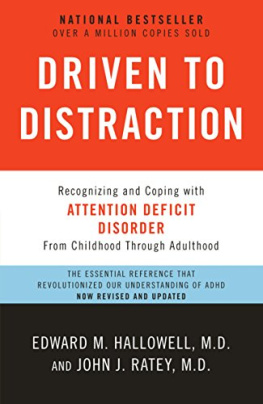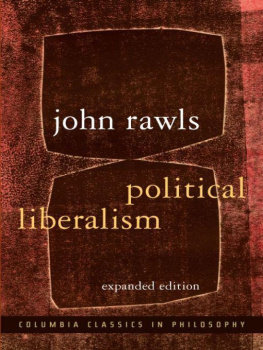John H. Hallowell - The Decline of Liberalism as an Ideology
Here you can read online John H. Hallowell - The Decline of Liberalism as an Ideology full text of the book (entire story) in english for free. Download pdf and epub, get meaning, cover and reviews about this ebook. year: 2013, publisher: Read Books Ltd., genre: Religion. Description of the work, (preface) as well as reviews are available. Best literature library LitArk.com created for fans of good reading and offers a wide selection of genres:
Romance novel
Science fiction
Adventure
Detective
Science
History
Home and family
Prose
Art
Politics
Computer
Non-fiction
Religion
Business
Children
Humor
Choose a favorite category and find really read worthwhile books. Enjoy immersion in the world of imagination, feel the emotions of the characters or learn something new for yourself, make an fascinating discovery.
- Book:The Decline of Liberalism as an Ideology
- Author:
- Publisher:Read Books Ltd.
- Genre:
- Year:2013
- Rating:5 / 5
- Favourites:Add to favourites
- Your mark:
- 100
- 1
- 2
- 3
- 4
- 5
The Decline of Liberalism as an Ideology: summary, description and annotation
We offer to read an annotation, description, summary or preface (depends on what the author of the book "The Decline of Liberalism as an Ideology" wrote himself). If you haven't found the necessary information about the book — write in the comments, we will try to find it.
The Decline of Liberalism as an Ideology — read online for free the complete book (whole text) full work
Below is the text of the book, divided by pages. System saving the place of the last page read, allows you to conveniently read the book "The Decline of Liberalism as an Ideology" online for free, without having to search again every time where you left off. Put a bookmark, and you can go to the page where you finished reading at any time.
Font size:
Interval:
Bookmark:
DECLINE OF LIBERALISM
AS AN IDEOLOGY
GERMAN POLITICO-LEGAL THOUGHT
by
JOHN H. HALLOWELL

FILIUS GRATUS
What the notions of form and harmony were to Plato, that the notions of individuality and competition were to the nineteenth century. God had placed his bow in the skies as a symbol; and the strip of colours, rightly read, spelt competition. The prize to be competed for was life. Unsuccessful competitors died; and thus, by a beautiful provision of nature, ceased from constituting a social problem.
A. N. WHITEHEAD, Adventures of Ideas.
With the rise to power of the National Socialists in Germany liberal political institutions collapsed like a house of cards tumbled over by a gust of wind. The rapidity and completeness with which liberal institutions were destroyed suggested that the spirit in which these institutions were originally conceived had reached a heretofore unsuspected stage of inner degeneracy. For no nation, however severely beaten into submission, however cleverly seduced by the winning wiles of a master propagandist, would calmly submit, without resistance or civil war, to the wanton destruction of political institutions if these were securely and deeply rooted in the spiritual consciousness of the people. That it was possible expeditiously to annihilate liberal institutions without more than a murmur of dissent is eloquent testimony to the degeneracy of German postwar liberalism.
How was it possible for prominent professors, judges, lawyers, and civil servants, who before 1933 were professed liberals, to accept, and some even to acclaim, a despotism that not only repudiates the fundamental postulates of liberalism but seeks actively to banish every liberal institution from the face of the earth? It is the purpose of this study to suggest a possible answer.
In 1837, when a Hanoverian government abrogated a constitution it had sworn to uphold, that act met with vigorous popular protest, a protest that found intellectual expression in the now famous statement drafted by seven Gttingen professors. But in 1933 those German intellectuals who did protest against despotism were conspicuous because they were comparatively few. In 1933 there was no Dahlmann to ask, as he did in 1837, Must I teach henceforward that the supreme principle of the State is that whatever pleases those in power is law? As a man of honour, I would cease to teach rather than sell to my audience for truth that which is a lie and a deceit. That there was no organized collective resistance in 1933 such as there was in 1837 suggests, not that the German intellectual of the twentieth century was any less brave or vocal than the intellectual of a century before, but rather that his liberal convictions were less securely and deeply rooted.
In view of this the suspicion arises that liberalism was not murdered, as is often said, but that it committed suicide. The suspicion arises that probably the death of the liberal ideology in Germany and the subsequent destruction of the institutions which were originally conceived and established to translate its aspirations into practice, is to be attributed less to the machinations of Hitler and the National Socialists than to the liberals themselves. A desire to test the validity of this hypothesis motivated the undertaking of this study. And if liberalism, by some inner necessity to be found in the ideology itself, develops from something live and vigorous to something decadent and degenerate, then this analysis, although confined for the purposes of this study to Germany, should have especial interest to those who are concerned about the survival of liberal political institutions wherever found.
To ascertain when and how liberalism as an ideology became decadent in Germany is the purpose of this study. Except by implication I have not tried to answer the somewhat more difficult question why liberalism became decadent. Confronted with the formalism of a Kelsen, who, while asserting himself a liberal, in effect declares every state to be a Rechtsstaat, I have endeavoured to search further for the roots of his thought and to examine the development that produced him. The process of formalization that characterizes the decline of the liberal ideology is described in the pages that follow.
Although, for the purposes of this study, attention has been focused primarily upon the development of ideas rather than institutions, I do not feel that my study is unrelated to practical political developments. I recognize a mutual dependence and a reciprocal influence between ideas and institutions, between theory and practice, between ideologies and practical politics. Ideas are not generated in a vacuum. They have a sociological, as well as a physical, background. In focusing attention primarily upon ideas I attempt to keep this in mind, but I am particularly aware that institutions, as the structural expressions of conceptual schemes, need a consistent ideational foundation if they are to enjoy a vigorous and live existence.
Vigorous institutions require deep-rooted convictions. So long as there is a close correlation between the faith, the aspirations and ideals, of any particular society and the institutions that are established to translate those aspirations into practice, the order thereby created appears stable, rational, and orderly. When, however, this close correlation is lacking, when institutions, in the eyes of the great mass of people, fail to fulfil the faith which originally inspired them, the order becomes disorder, the system appears irrational and degenerate. Rationality itself, then, is in large measure a function of the relationship between mans faith and mans deeds, his inarticulate premises and his experience, his philosophy of life and his way of life. While I have directed my attention primarily to an analysis of the development of the liberal ideology, I have by implication, I believe, said something of significance about the development of liberal institutions. Political institutions are shaped, to a considerable degree at least, by mans conception of himself and of his place and function in society.
If we recognize that liberalism in the Germany of 1933 was decadent the logical inference is that there must be some liberalism as it ought to be. The word decadent itself suggests a departure from or perversion of original or integral ideas. If one acknowledges the degeneracy of post-war German liberalism as it found expression in the writings of men like Kelsen and Carl Schmitt (and one is forced to do so if he concedes that irresponsibility is incompatible with individual freedom) he must further concede that there is such a thing as liberalism integrally conceived. The notion of decadence presupposes it.
Accordingly, the first task of my study has been the reconstruction of liberalism as an integral system of ideas, the delineation of the idea of liberalism in the Platonic sense. Since definitions at best are but symbols of a process of thought, I have not endeavoured to define liberalism in succinct phrases but rather to distinguish it by describing in some detail the attributes that characterize it. In order to do so it has been necessary to examine the philosophical roots of liberal thought, to find the fundamental presuppositions that constitute its inarticulate premises.
Thus, so far as my study is accurate, it should contribute something to a more precise conception of liberalism. This is needed to-day and especially in the United States where practically everyone calls himself a liberal and embodies in the term all that is congenial to his particular way of thinking. It has been customary in this country to distinguish the continental meaning of the word liberal from the American use of the word. Now, although it has been fairly clear that when a contemporary American uses the word liberal he means something very different from the eighteenth-century continental meaning of the word, it has not been clear in a positive way what he actually means by it. This confusion is possibly the result of an uncertain, if not aberrant, conception of liberalism. For the sake of clarity, the word liberal should be used to describe one who believes in liberalism; it should be more precisely defined than it is to-day or else it should be abandoned.
Font size:
Interval:
Bookmark:
Similar books «The Decline of Liberalism as an Ideology»
Look at similar books to The Decline of Liberalism as an Ideology. We have selected literature similar in name and meaning in the hope of providing readers with more options to find new, interesting, not yet read works.
Discussion, reviews of the book The Decline of Liberalism as an Ideology and just readers' own opinions. Leave your comments, write what you think about the work, its meaning or the main characters. Specify what exactly you liked and what you didn't like, and why you think so.

